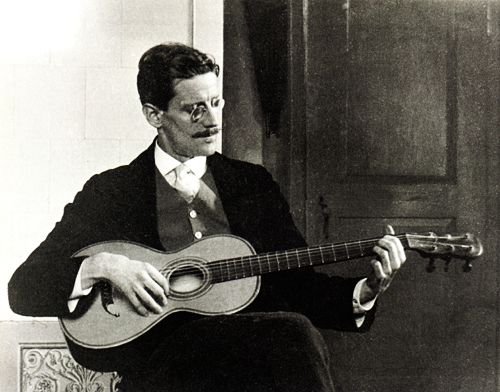Today, Mahlerman examines the legacy of James Joyce: the language in the music, and the music in the language…
The great modernist writer James Joyce was so saturated in music that, for a while as a young man, he considered devoting his life to it, but although music’s loss became literature’s gain, the two art-forms are in a constant embrace throughout most of his novels, as he appeared to superimpose onto music his own magically naturalistic literary dreamscape. A fine pianist, he possessed a sweet tenor voice and, through deep study, an encyclopedic knowledge of music from as far back as the Renaissance. The now-famous difficulty that most of us have with his ‘language pushed to the limits of language’, particularly in the two leviathans Ulysses and Finnegans Wake, is that much of it is simply too dense and impenetrable and, in this age of instant gratification, we tire quickly. But ‘from swerve of shore to bend of bay’, our loss is plain to hear below.
To anyone who has read Ulysses [for tips on how to, see Brit’s 1p Review here], it is often mentioned as a favourite – and the mesmeric conclusion of the book are the eight vast sentences of over 4000 words that make-up the internal musings of Leopold Bloom’s randy wife Molly Bloom, as her fertile memory and imagination go to work. The use of ‘yes’, at the start and finish, endorses Joyce’s view of it as ‘the female word’, and ‘the most positive word in the English language’. For this most complex of men, this tiny word had an almost carnal significance, and represented ‘acquiescence and the end of all resistance’. How ‘musical’ it sounds, breathed into life here by the great Abbey actress Marcella Riordan.
The influence that music exercised upon Joyce is matched by his influence on countless other writers and musicians – Boulez, Cage and Barber are just a handful. And when the Italian iconoclast composer Luciano Berio fulfilled his commission to the NY Philharmonic in 1969 by producing his amazing Sinfonia, the debt to Joyce was clear to hear – although the text is by Beckett and Levi-Strauss. Against a tapestry of the third movement scherzo of Mahler’s Second Symphony, Berio layers misty fragments from Debussy’s La Mer, Ravel’s La Valse, as well as some Schoenberg, Brahms, Stravinsky’s Rite, and a chunk of Beethoven’s Pastoral Symphony. This gallimaufry shouldn’t work but it does, gloriously.
Although both men were born in suburban Dublin, Joyce was 25 and working in a bank in Rome when Samuel Beckett first saw the light of day in 1906. They met often and Beckett became, in effect, a Joyce scholar and paladin. The stock view of these two giants has it that Joyce is a wordy motormouth and Sam is a monosyllabic near-mute and here, in less than three minutes of Theatre de L’Absurde, the writer and director Donald Clarke imagines the two meeting on a Zurich Pitch ‘n’ Putt – in itself, a mad thought.
In the mid 1930’s, on a trip to Zurich to see his opthalmologist, Joyce sought-out the then well known Swiss composer Othmar Schoeck. They became friends and Joyce, always a supporter of the avant-garde, an enthusiastic champion of the composer. As with the near eclipse of Gustav Holst, it remains a mystery why this distinguished figure is now virtually forgotten, his music heard almost never. Many of his orchestral and vocal pieces are bathed in a marvellous post-Wagnerian glow, as here in the first part of the delightful Summernight for String Orchestra.












I took the time to re-read Ulysses during the time leading up to the centennial of Bloomsday. The first time I had read it, I was most taken with the verbal fireworks of the National Library scene; this time, it was the luncheon at the Ormond bar, with Simon Dedalus singing.
Wonderful, the Joyce and Beckett: fecund in its nuttiness indeed. And now I must seek out Othmar Schoeck.
Also discovering the formerly well known Swiss composer for the first time, thanks Mahlerman… and ‘Summernight’ sounds rather lovely – especially with all that snow outside.
A pure joy, MM. I am a Joyce man – as with Beckett, people don’t realise how funny he is, and as the clip shows, the line between silly schoolboy humour and great art is a porous one.
I’d never heard of Berio – an early example of mash-up, fascinating.
As ever, an enjoyable education Mahlerman. But this one is particularly imaginative I think. Is there a seam to be mined in aural appreciations of great artists?
Great to be referred to the 1p Ulysses review, which I must have missed earlier, with its excellent advice and perceptive point about the absence of cliche in Joyce’s writing. Few writers have achieved that, I think.
Yes Brit, thanks for the link as I too missed it first time around. Often been asked something similar about Schoenberg/Berio et al. A tot of single malt isn’t a bad idea I guess. Sinfonia is, like Ulysses, quite hilarious – and on another level, it can be fun to just sit back and ‘name that tune’, as there is almost certainly something you will know. But if you insist on being a highbrow (see Susan’s chart) you can just admire the imagination and skill of this great Italian, and go off and discover something else wonderful.
A wonderful and original post Mahlerman.
great stuff – hoping for more of these!
And don’t forget John Cage. Roaratorio ‘A circus on Finnegans Wake’ if you have an hour to spare and an open ear.
http://www.youtube.com/watch?v=bdHe4c10smY